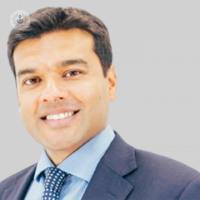Cataracts decoded: Symptoms, surgery, and lens options
Written in association with:Cataracts, a common age-related condition causing clouding of the eye's lens, pose significant challenges. Understanding their symptoms, treatment decisions, and lens options is vital. In his latest online article, Mr Venki Sundaram explores these aspects while emphasising patient empowerment.

Deciphering cataracts: What you need to know
A cataract, simply put, is a clouding of the lens in the eye. It's a natural process that occurs with age, affecting nearly everyone to some degree as they grow older. However, certain factors such as diabetes, eye inflammation, steroid use, or trauma can expedite this process, leading to cataracts forming at a younger age.
Recognising the signs: Do you have a cataract?
Symptoms of cataracts tend to manifest gradually over time, varying in severity from person to person. Some common indicators include a gradual reduction or clouding of vision, diminished clarity of colours and objects, and increased sensitivity to glare, particularly noticeable when driving at night or in bright light conditions.
The decision point: When is cataract surgery necessary?
The decision to undergo cataract surgery is typically based on the impact the condition has on one's daily life. If cataracts significantly impede activities such as driving, reading, or enjoying hobbies, surgery may be recommended to improve quality of life and visual clarity.
Navigating cataract surgery: Understanding the procedure
Cataract surgery is among the most common and successful surgical procedures globally, boasting an impressive safety record and high success rates. The process involves three main stages: preparation before surgery, the surgical procedure itself, and post-operative care.
Understanding the risks: What you should know
While cataract surgery is generally safe, as with any surgical procedure, there are inherent risks. These include a minimal risk of severe or permanent vision loss, the possibility of requiring additional surgery to address complications, and the potential need for laser treatment to address issues that may arise post-surgery.
Choosing the right lens: Exploring your options
One of the critical aspects of cataract surgery is selecting the appropriate lens implant. There are several types available, each catering to different visual needs and preferences. These include monofocal lenses, enhanced monofocal lenses, multifocal lenses, and toric lenses, each offering unique benefits and considerations.
Mr Venki Sundaram is an esteemed consultant ophthalmologist. You can schedule an appointment with Mr Sundaram on his Top Doctors profile.


